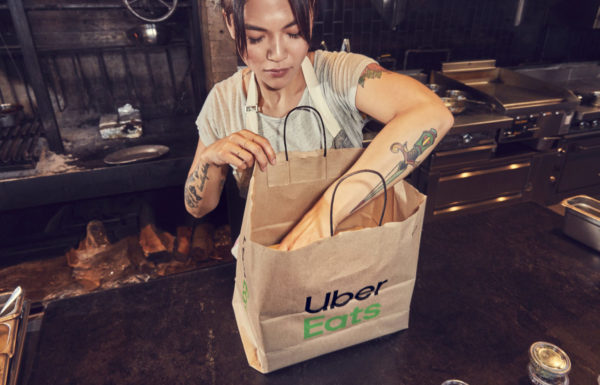
Uber Eats is among the companies that will be affected by a Denver measure that caps the commission paid by restaurants at 15 percent. (Photo courtesy of Uber Eats)
Denver is the latest city to throw a wrench in the business model of restaurant delivery apps.
The City Council on Monday unanimously approved a four-month measure capping the commissions paid by restaurants to companies like Uber Eats and DoorDash at 15 percent, in an effort to benefit smaller restaurant operators.
The city joins others like New York, San Francisco and Los Angeles, which passed similar regulations earlier in the pandemic, as government mandates restricted restaurants to takeout-only in many places.
The Denver measure is set to end on Feb. 9.
The ordinance doesn’t impact the delivery fee the apps typically charge diners, but rather the cut that the companies take of the overall order before transmitting the rest of the funds to the restaurant.
Councilwoman Kendra Black, who spearheaded the effort, said at a previous committee meeting the commission has been as high as 35 percent. While restaurant chains are often able to negotiate with the apps to reduce the commission paid on their orders, individuals who own a restaurant or two have less bargaining power, she said.
“It’s really the little guys that are paying the highest rates, and it really does hurt them,” Black said.
The ordinance also requires that restaurants opt in to appearing on the company’s platforms, that 100 percent of tips go to the delivery driver, and that driver pay not be reduced in an effort to make up for the commission cap.
The 15 percent figure was requested by the Colorado Restaurant Association, which was also involved in discussions regarding the measure. The delivery companies will still be able to take a larger cut if restaurants opt to purchase marketing or additional services.
In terms of enforcement, Denver Economic Development and Opportunity, a city office, will maintain a complaint form for individuals to submit potential violations. Violators would be given an opportunity to correct, and if they fail to do so the complaint would be passed to the Department of Finance’s Treasury Division for further enforcement. The measure allows for violators to be fined up to $999 per violation per day.
Contacted by BusinessDen last month, two delivery companies spoke against the measure. A DoorDash spokesman said, “commission caps are a form of price fixing that can have many unintended consequences.” Uber Eats said “regulating the commissions that fund our marketplace forces us to radically alter the way we do business and ultimately hurt those that we’re trying to help the most: customers, small businesses and delivery people.”

Uber Eats is among the companies that will be affected by a Denver measure that caps the commission paid by restaurants at 15 percent. (Photo courtesy of Uber Eats)
Denver is the latest city to throw a wrench in the business model of restaurant delivery apps.
The City Council on Monday unanimously approved a four-month measure capping the commissions paid by restaurants to companies like Uber Eats and DoorDash at 15 percent, in an effort to benefit smaller restaurant operators.
The city joins others like New York, San Francisco and Los Angeles, which passed similar regulations earlier in the pandemic, as government mandates restricted restaurants to takeout-only in many places.
The Denver measure is set to end on Feb. 9.
The ordinance doesn’t impact the delivery fee the apps typically charge diners, but rather the cut that the companies take of the overall order before transmitting the rest of the funds to the restaurant.
Councilwoman Kendra Black, who spearheaded the effort, said at a previous committee meeting the commission has been as high as 35 percent. While restaurant chains are often able to negotiate with the apps to reduce the commission paid on their orders, individuals who own a restaurant or two have less bargaining power, she said.
“It’s really the little guys that are paying the highest rates, and it really does hurt them,” Black said.
The ordinance also requires that restaurants opt in to appearing on the company’s platforms, that 100 percent of tips go to the delivery driver, and that driver pay not be reduced in an effort to make up for the commission cap.
The 15 percent figure was requested by the Colorado Restaurant Association, which was also involved in discussions regarding the measure. The delivery companies will still be able to take a larger cut if restaurants opt to purchase marketing or additional services.
In terms of enforcement, Denver Economic Development and Opportunity, a city office, will maintain a complaint form for individuals to submit potential violations. Violators would be given an opportunity to correct, and if they fail to do so the complaint would be passed to the Department of Finance’s Treasury Division for further enforcement. The measure allows for violators to be fined up to $999 per violation per day.
Contacted by BusinessDen last month, two delivery companies spoke against the measure. A DoorDash spokesman said, “commission caps are a form of price fixing that can have many unintended consequences.” Uber Eats said “regulating the commissions that fund our marketplace forces us to radically alter the way we do business and ultimately hurt those that we’re trying to help the most: customers, small businesses and delivery people.”

Leave a Reply